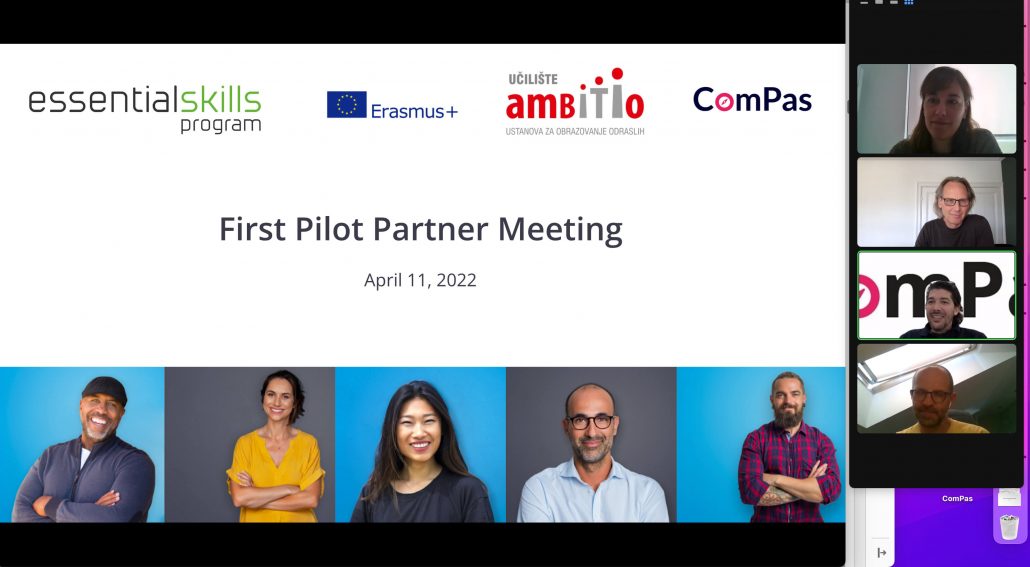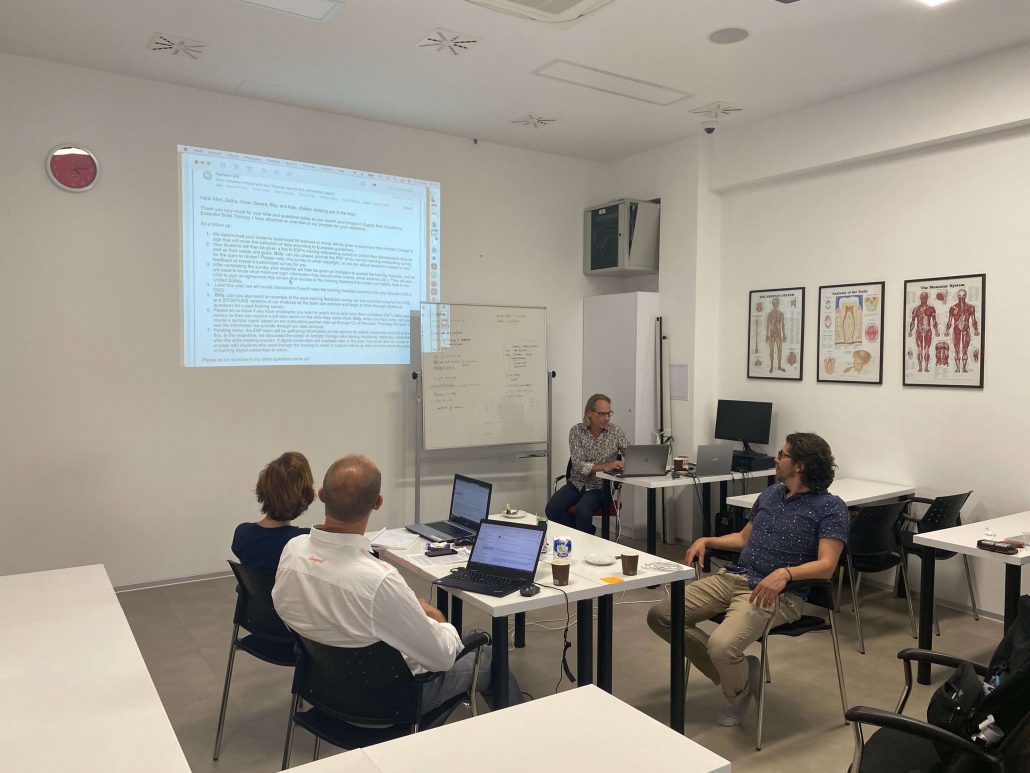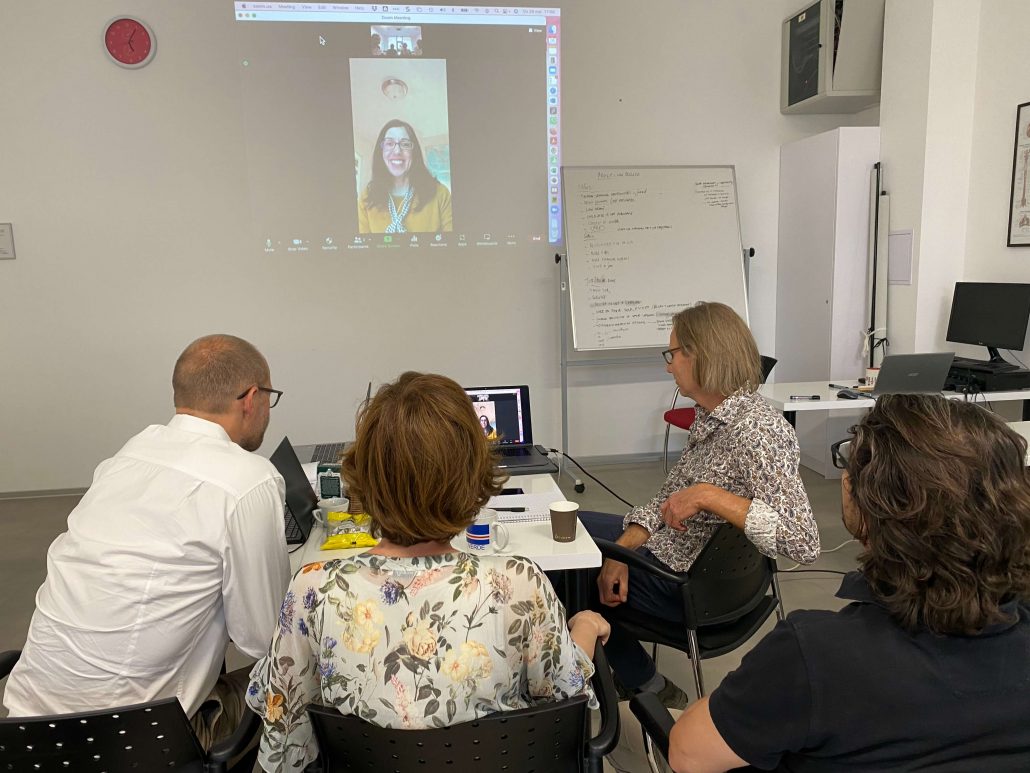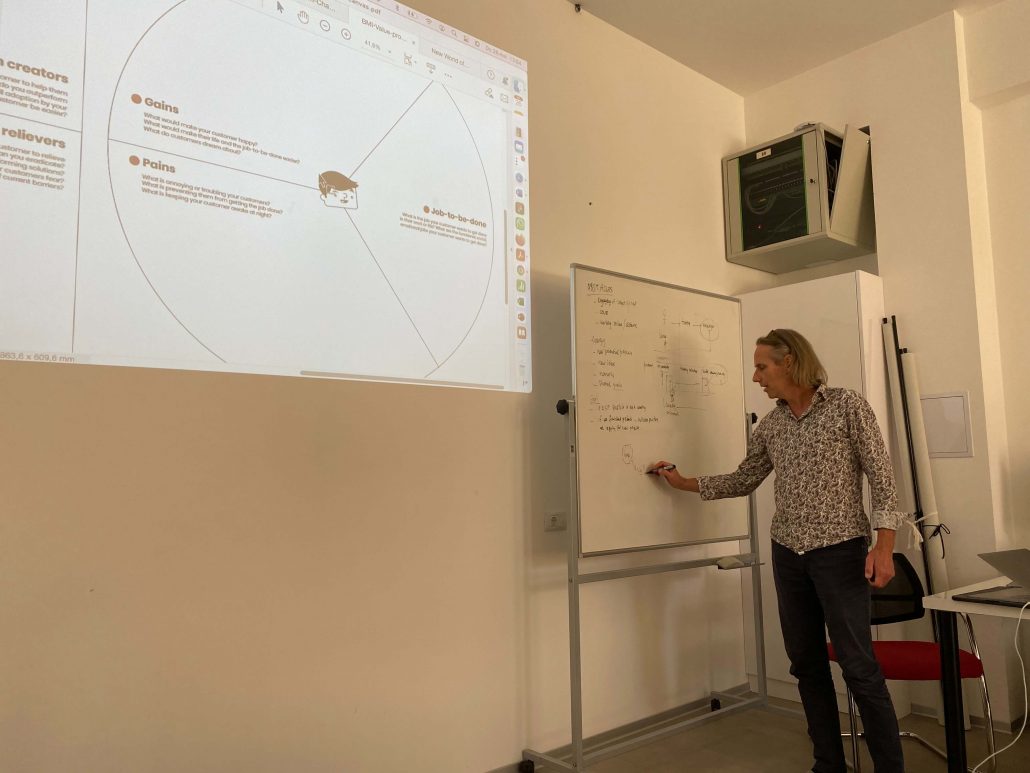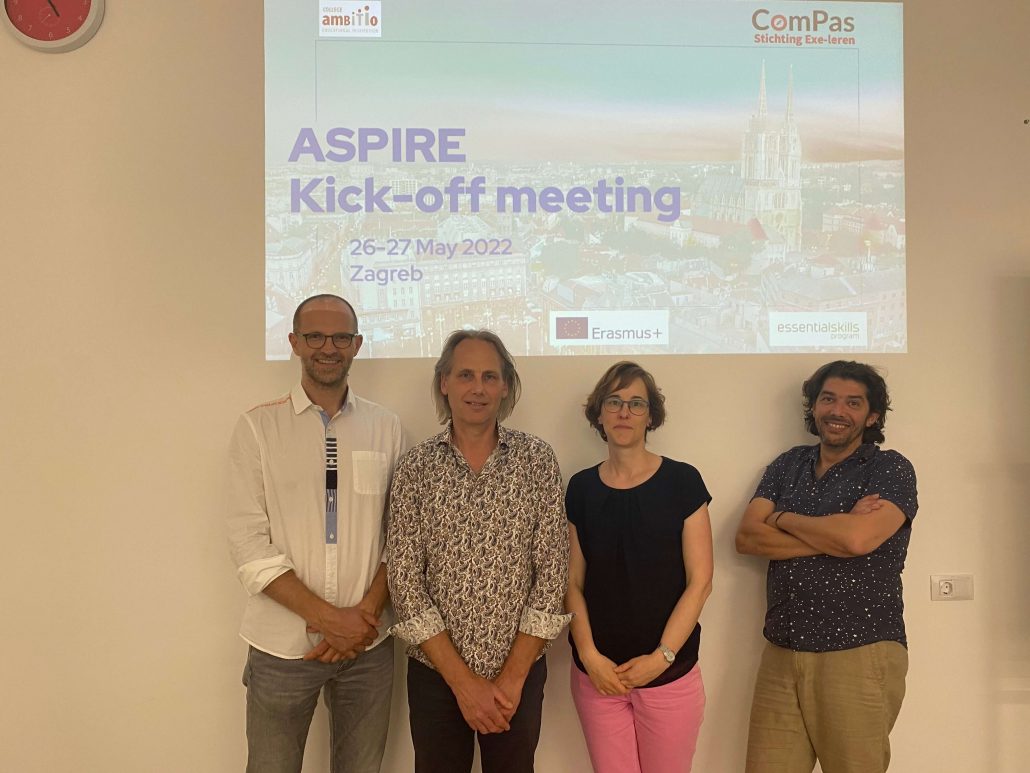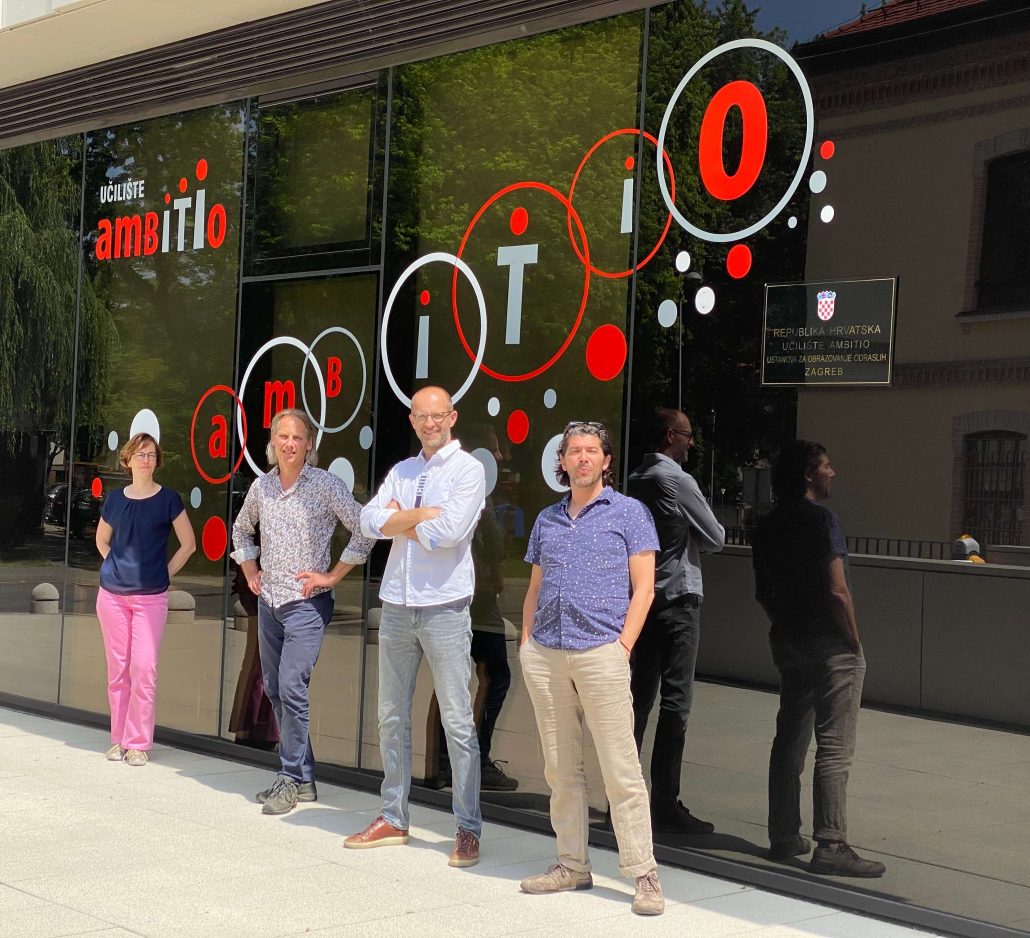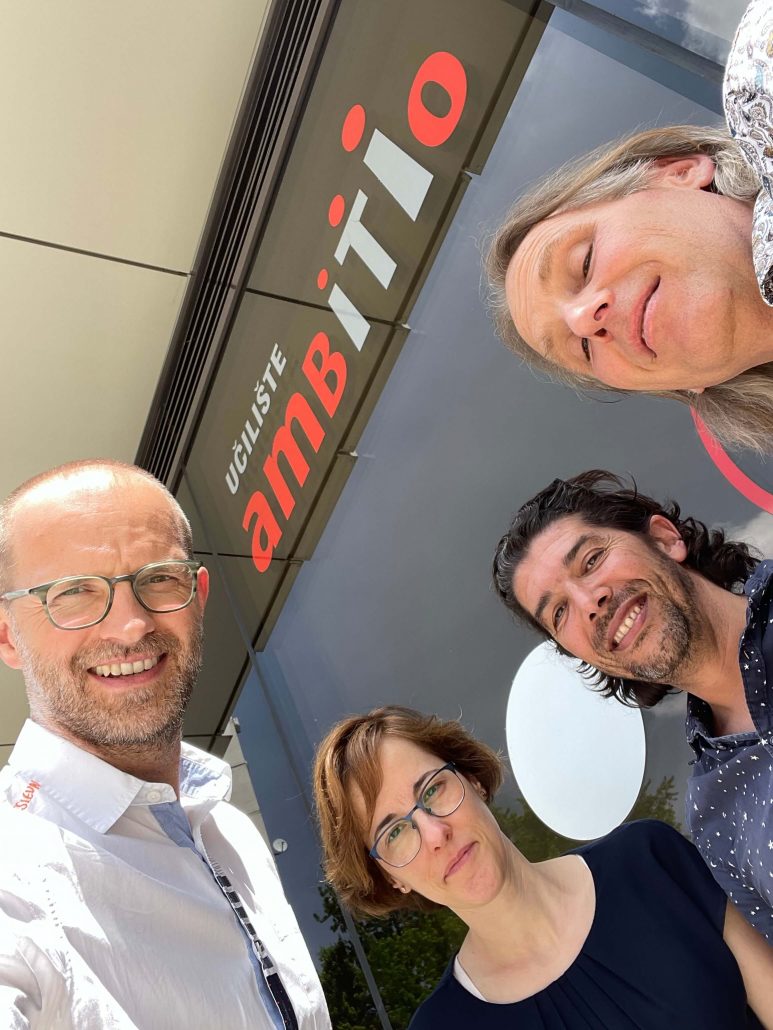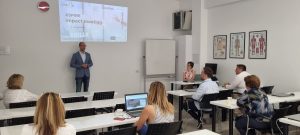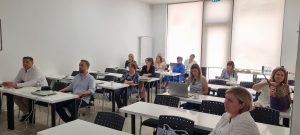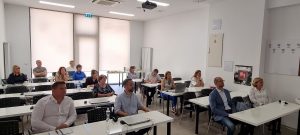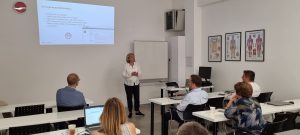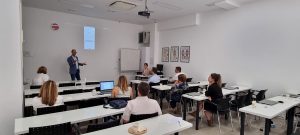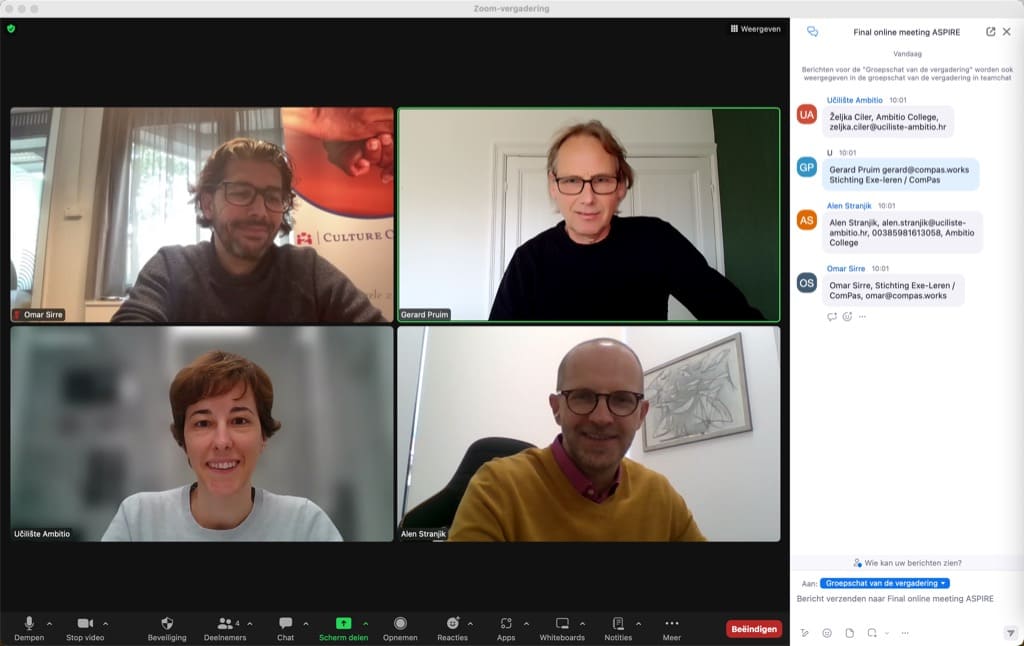11th April 2022
First Pilot Partner Meeting
Ambitio College has participated at the first pilot partner meeting online held by the cordinator Stichting Exe-Leren.
26th and 27th May 2022 – Kick-off meeting in Zagreb
The project coordinator Stichting Exe-Leren from Netherlands has held the first meeting with Ambitio College in Zagreb.
Two-days meeting was a great opportunity for partners to get to know each other personally and professionally, to learn about their scope of work environment and to discuss, share and develop ideas based on knowledge and mutual expertise in the field of adult education which will help to successfully implement the project activities. It was also a great start to be able to communicate the project goals and objectives to ensure the partners are clear on what they should be doing in the project.
On the first day of the meeting the partners have discussed their assumptions about possible reaction of the target groups and other stakeholders who will be soon involved in the activities based on the input from the Essential Skills Program (ESP) and previous work. They were also brainstorming about what will work and what will not work in the process of introducing ESP online skills courses to them within this project. Later, they defined and brainstormed the needs of target group (low-skilled adults, trainers, and employers) and begun segmenting them. At the end of the day partners had an online meeting with the associated partner ESP USA who provided them the initial introduction into Essential Skills Program – 10 online soft skill courses and process of collaboration within the project.
On the second day of the meeting the partners continued their focus on segmenting trainers and employers needs in this process. At the end of the day, the key hypothesis was documented which will be tested within this project. Furthermore, partners also agreed about next steps in the project.
June – August 2022.
During the summer months partners has been working on creating questionnaires for the target groups (unemployed people, employers, employees and trainers) that they will include in the project. For this purpose partners have been having frequent online meetings to jointly create questionnaires and agree on the details of the implementation itself. Questionnaires will be used to research the needs of target groups related to the development of soft skills. They will also investigate whether there is a need to introduce the Essential Skills Program – an online course for the development of soft skills in Croatia and the Netherlands.
September – December 2022
From September to mid-November partners were contacting relevant stakeholders to motivate them to take a survey about the importance of soft skills development at workplace. They had to fill in two surveys. In first survey they had to answer questions related to soft skill culture at workplace and their thoughts on soft skills in general within their organizations. In second survey they had to give us feedback on which soft skills are the most important for each economic sector they are coming from and what they value the most.
The project partners collected the information from the surveys and meetings with stakeholders. After analysing this the coordinator of the ASPIRE project planned to build the prototype in Activity 3. Based on the outcome of the analysis the coordinator planned to introduce longer iterations in creating the prototype. Therefore, an amendment was submitted to the Dutch agency to postpone the project for 6 months. The agency accepted this amendment so the project will end on 1-11-2023.
January – March 2023
Partners has started building the prototype so potential learners and skill trainers can test and provide feedback. This prototype potentially creates learning opportunities like soft skills training that help learners identify and fill skill gaps to help them achieve their professional goals and provide them with personalized learning recommendations. These recommendations are based on skills data from an acquired digital credential and can be connected with the organizational skills culture and regional labour market data. The goal is to learn from the feedback and build a better prototype prior to building the real product and investing a significant number of resources into the full development of the product.
April – May 2023
During the months of April and May, the partners tested the prototype of one soft skills training module on the topic of effective communication. The test participants in Croatia were soft skills trainers and unemployed and employed people. The participants also filled out an introductory questionnaire at the beginning of the test and at the end filled out an evaluation questionnaire about the satisfaction of using the prototype. All data will be processed in the final report.
May – August 2023
Partners worked on additional content/features of the prototype. The prototype has the function of empowering individuals with the necessary soft skills through training, and also helps individuals understand how these skills fit into the labour market and specific organizations. At the same time, it connects learning outcomes from soft skills training with the recommendation mechanism for the most important skills in the labour market. It also uses digital badges as evidence of acquired skills in non-formal education and acts as a ‘skills passport’, enabling individuals to demonstrate their learning journey, identify their strengths and areas for improvement. The partners believe that bridging the gap between learning outcomes and labour market demand increases employability and contributes to the personal and social development of individuals, especially among vulnerable groups.
20th September 2023
The impact meeting was held. The meeting brought together unemployed and employed people, employers, soft skills trainers and representatives of the labour market institution and institution related to e-infrastructure and digital services and information and communication technologies for the needs of the academic and scientific community in Croatia. The results of the project activities and ASPIRE prototype were presented. The participants of the meeting agreed that the ASPIRE prototype is relevant and very easy to use, and that it needs to be promoted in Croatia so that it becomes visible and recognizable to all stakeholders. Most of the participants also agreed that the prototype can contribute to better alignment of personal skills with the skills culture of the organization or team, education and training with further career development opportunities, employee skills (soft skills) with career development opportunities and more effective professional guidance and training. They also agreed that it can provide employers with more opportunities to hire and retain people, and ultimately contribute to reducing discrimination in the labour market and increasing social inclusion.
31st October 2023 – Final project meeting
A final meeting of partners was held online with the aim of evaluating the work of partner organizations related to the Essential Skills Program – provider of educational services and to create a strategy which will contribute to the attractiveness of ESP for participants and other stakeholders.
In the introductory part of the meeting, the results of all activities were discussed, as well as lessons learned and success criteria necessary for the effective implementation of ESP in the European context. Indicators for successful implementation within each partner organization were considered and whether ESP solves relevant problems, whether it contributes to the sustainable growth of organizations, and how practical, desirable, and sustainable it is in the European context. The goal of the partner organizations was to identify the features and strategies that would make ESP the preferred choice. The partners also considered the unique needs and practices of different European countries and how these might influence the adoption of ESP. The lessons learned in the project were reviewed and the success of both organizations in relation to the set goals was assessed. In this context, the partners discussed what worked during the project, what did not and how the approach can be improved. The conditions necessary for the successful introduction and use of ESP across Europe were examined and various strategic and operational factors to be addressed were discussed.
The meeting concluded with a summary of key points and a consensus on the importance of adapting the ESP to meet the different needs of the European labour market. The partner organizations have undertaken to produce a report that will describe in detail the research results and conclusions and recommendations for the future direction of ESP.


























